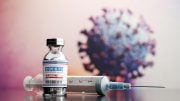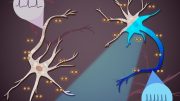
A new study suggests that analyzing a specific cell surface protein may predict those at risk of severe COVID-19 infection.
In a new study, researchers from University of Copenhagen show that the phenomenon of cell fitness could predict the host’s immune response to a COVID-19 infection. The discovery could prove to be important for pandemic management.
As parts of the Western world are slowly returning to normal, many countries in the low- and middle-income countries are still fighting and fearing new outbreaks of COVID-19. And for most it feels almost unbearable to endure another new wave of the virus, which could end in more deaths and long-term persistent symptoms from COVID-19 infection.
In a new study, researchers from University of Copenhagen present what could be a much-needed helping hand to fight the virus. The study shows that analysis of a particular protein on the cell surface is likely to predict who is in danger of a serious infection caused by the virus, explains Assistant Professor Rajan Gogna, lead author of the new study.
“Cells have a so-called fitness status, and by analyzing it we could predict hospitalization or death in COVID-19 patients, potentially making such a biomarker an earlier prediction tool, especially because it can be detected from the common nasal swab covid-19-tests,” says Rajan Gogna from the Won Group at the Biotech Research & Innovation Centre.
If the cell fitness status is poor, it indicates that the cell does not develop well, either because the cell is aged, lacks reliability, has an ill-functioning metabolism, or is disease-prone, etc. Earlier in 2021, the research team discovered that fitness status is expressed in proteins called flower proteins. These flower proteins are on the surface of the cell, and they are expressed in two forms, explains Rajan Gogna.
“In one form, they tell the surrounding cells that this cell is doing well. In the other form, they indicate to the surrounding tissue, that this particular cell is not doing well and thus has a bad fitness status. If the cell’s fitness status is not great, the cell will get phased out and killed by the surrounding cells.”
Accurate prediction of serious infection
Especially helpful in cases of the early phase of COVID-19 illness, the flower protein expression could accurately predict hospitalization or death as well as predict who would have a less serious infection.
“The method could predict who needed hospitalization with an accuracy of 78.7 percent. With COVID-19 patients who would not have a serious infection, the prediction was accurate at 93.9 percent,” says Associate Professor and Group Leader Kyoung Jae Won, who analyzed the data using machine learning.
In order to analyze the data, the researchers performed a post-mortem examination of the infected lung tissue in deceased COVID-19 patients to determine the flower proteins’ biological role in acute lung injury, which is the main cause of death from the disease.
By using nasal swab samples, they also performed an observational study to evaluate whether the protein expression could accurately predict hospitalization or death.
“The cell fitness, expressed by the flower protein, could help explain why some people respond poorly to COVID-19 and provide opportunity for pre-identification of high-risk individuals. This discovery has the potential to help save their lives by severely alerting them to be extra protective of themselves, or until they are fortunate enough to get their hands on a vaccine. In some other nations, the population in general has great hesitancy against vaccination. But people are not hesitant about a test, and we hope this will improve outcomes,” says Rajan Gogna.
Cell fitness is not just about your age
Cell fitness is relative to many things in our bodies and does not necessarily alter with age. Age has an impact, but the researchers have seen many cases from their database where people who are 80 years of age have a very good fitness profile of lungs, which is the main area where cell fitness is measured to predict COVID-19 infection outcome, explains Rajan Gogna.
“We have also seen young people die in countries like India, Indonesia, and Brazil. Because it is not only age but the comorbidities which has an impact on the fitness level of the cell in both the upper and lower respiratory tract. Also the insulin signaling, diabetes, and hypertension are known to play a role in determining the cell fitness,” says Rajan Gogna.
The researchers hope their discovery is timely, because of the persistency of COVID-19 and rising cases and deaths in various nations outside the Western world despite vaccines.
“In many countries, the populations need protection from the worst outcomes. We believe that these places could benefit from our discovery,” says Rajan Gogna.
Reference: “Flower lose, a cell fitness marker, predicts COVID-19 prognosis” by Michail Yekelchyk, Esha Madan, Jochen Wilhelm, Kirsty R Short, António M Palma, Linbu Liao, Denise Camacho, Everlyne Nkadori, Michael T Winters, Emily S Rice, Inês Rolim, Raquel Cruz-Duarte, Christopher J Pelham, Masaki Nagane, Kartik Gupta, Sahil Chaudhary, Thomas Braun, Raghavendra Pillappa, Mark S Parker, Thomas Menter, Matthias Matter, Jasmin Dionne Haslbauer, Markus Tolnay, Kornelia D Galior, Kristina A Matkwoskyj, Stephanie M McGregor, Laura K Muller, Emad A Rakha, Antonio Lopez-Beltran, Ronny Drapkin, Maximilian Ackermann, Paul B Fisher, Steven R Grossman, Andrew K Godwin, Arutha Kulasinghe, Ivan Martinez, Clay B Marsh, Benjamin Tang, Max S Wicha, Kyoung Jae Won, Alexandar Tzankov, Eduardo Moreno and Rajan Gogna, 18 October 2021, EMBO Molecular Medicine.
DOI: 10.15252/emmm.202013714









Great… another expensive test the medical community can get paid for. What about the Vit D level of every dead covid patient which has been shown to be under 40. Also were all of the lung cells tested from Remdesivir fed patients. That would be worth knowing also. People all you need to do is take Vit D, Quercetin, Vit C and Zinc and the virus will have difficulty replicating. And of course the I and H C Q medicine that you can’t mention and have trouble getting. It’s out there if you are persistent. This whole plandemic is not about your health so that is part you have to handle yourself.
I assume the “long-term persistent symptoms from COVID-19 infection” class is a euphemism for permanent “vaccine” damage – the loss of 5% of a person’s immune system weekly?
Glad I’ll never take the murder shot.
Medicare is doing an under the radar study on Vitamin D levels.
This is exactly what should’ve been worked on from the very beggginig. By March we knew, via the quarantined ship Diamond Princess, that 80% wouldn’t get the virus, more than 10% would be asymptomatic, that those needing hospitalization would be less than 1% and deaths would be much less than 1%. And this was when people were mistreating the disease as a respiratory disease.
So almost 99% of the population had nothing or little to worry about. But instead of identifying who was vulnerable we had years of lockdowns and ‘vaccines’ that provide no immunity.
That’s March of 2020 we knew that over 90% would be unaffected by this. We’ve wasted a year and a half.